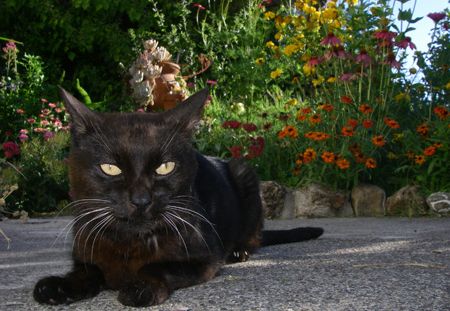New stem cell treatment zaps feline mouth pain, inspires human researchers
A clinical trial at UC Davis using fat-derived mesenchymal stem cells helped some cats with feline gingivostomatitis finally be pain-free.

Feeling no pain! Bob the cat underwent successful stem cell therapy to alleviate the lingering discomfort of feline gingivostomatitis. (Photo courtesy of UC Davis)
Even after all his teeth had been removed, Bob, a 14.5-year-old cat, was still in pain from feline chronic gingivostomatitis. In April 2013, Bob's owner decided to enroll Bob in a clinical trial involving stem cell therapy at the University of California, Davis, to treat this chronic oral inflammation nightmare.
Results from this clinical trial recently appeared in Stem Cells Translational Medicine.1 Luckily for Bob and four other cats out of the seven that completed the trial, the stem cell intervention worked. Bob was asymptomatic by his three-month recheck appointment. Sadly, Bob died several months ago of causes unrelated to feline chronic gingivostomatitis, according to a press release from UC Davis.
The trial
During the clinical trial, the researchers took each cat's own fat-derived stem cells, processing and characterizing them, and then gave them back intravenously to reduce inflammation and promote tissue regeneration. The cats received two intravenous injections of the stem cells, given one month apart.
“This is the first study to demonstrate the safety and efficacy of using this type of stem cell therapy for a naturally occurring, chronic inflammatory disease in cats,” says the study's lead author, Boaz Arzi, a veterinary dental surgeon at the UC Davis School of Veterinary Medicine in the press release. “We're the first researchers to come up with this patent-pending technique for any mammals, including humans.”
The researchers also found a potentially useful biomarker that could help determine whether cats will respond to stem cell treatment.
The spark
Arzi was inspired to try this treatment model in cats because of what cats like Bob had gone through-having all or nearly all of their teeth removed because of feline chronic gingivostomatitis but still experiencing the pain, even after several courses of corticosteroids and antibiotics.
“FCGS is a challenging disease to treat, and we were frustrated that some cats wouldn't respond to traditional treatment,” Arzi says in the release. “We were banging our heads against the wall, and this stem cell therapy was a last resort.”
The human link
One of the paper's co-authors, Nasim Fazel, a board-certified dermatologist and dentist at the UC Davis Health System, has been working collaboratively with the veterinary medicine team to perform comparative studies between histopathologic characteristics and blood inflammatory biomarkers of feline chronic gingivostomatitis and various chronic oral inflammatory conditions in humans such as oral lichen planus, aphthous stomatitis and vesiculobullous diseases.
For example, oral lichen planus, like feline chronic gingivostomatitis, is a T-cell-mediated chronic inflammatory mucosal disorder that has a similar disease presentation, clinical course and difficulty of treatment.
“I was really excited to hear about their work because the cat disease behaved very similarly to what I saw in my human patients with oral lichen planus,” Fazel says in the release. This research trial's success inspired her to submit a grant to establish a human clinical trial to use mesenchymal stem cell therapy to treat oral lichen planus.
“We're in desperate need of novel therapies to treat chronic inflammatory mucosal disorders such as oral lichen planus, which are challenging to treat and of major impact to patients' quality of life,” Fazel says. “Having this opportunity to translate what we're learning in veterinary medicine to human medicine and working together to bring therapies discovered in the cat model to chronic oral inflammatory diseases in humans is exciting and has great potential.”
Reference
1. Arzi B, Mills-Ko E, Verstraete FJ, et al. Therapeutic efficacy of fresh, autologous mesenchymal stem cells for severe refractory gingivostomatitis in cats. Stem Cells Transl Med 2016;5(1):75-86.